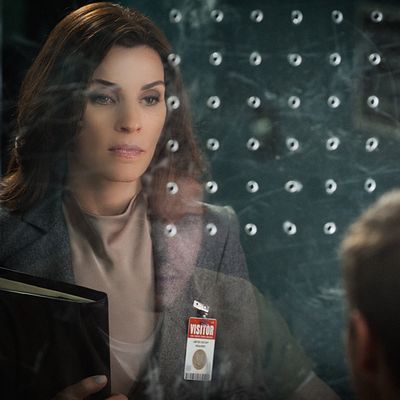
I know it’s not wise to make sweeping predictions about a season of television after only two episodes (and if we’re being honest, I’m only about halfway through episode two as I type this), but: Alicia’s running, right?
Alicia’s refusal of the it’s-not-a-campaign-check check from Ernie Nolan for Cary’s bail was a major clue, of course — Robyn was spot on when she told Alicia she had no reason to turn it down if she truly wasn’t running. And the fact that they’ve now dragged out Michael Cerveris as current State’s Attorney Michael Castro for guest appearances in back-to-back episodes is telling, too. But what struck me most was the way the shifting pieces of the episode had settled by its end. Cary is free (for now, if not for good), and Diane has officially left Lockhart/Gardner behind and brought a slew of attorneys along with her. It sets up three neat lines for the season: Cary’s case, Alicia’s campaign, and, of course, the work of the firm.
Plus — and here’s where I start overthinking things — can you really sell Valerie Jarrett on a guest appearance by telling her, “You’ll try to talk Alicia into running for State’s Attorney, but she’ll completely ignore your advice”? I could be wrong, but either way, I hope Alicia declares her candidacy or swears off completely within the next couple of episodes. There are positives to both outcomes, but weeks and weeks of back and forth will get old fast, no matter how hilarious it is to watch Eli create full-scale political performance art.
Meanwhile, Cary’s still in prison — the bail money Dexter Roja provided for him is tagged as invalid, since over 20 percent of the rostered members of Roja’s “health clubs” match up with names on Chicago-area death certificates. Alicia asks Peter if she can take a second mortgage on her apartment (he’s listed as an occupant), and the conversation in which he tells her no is a really compelling window into who they’ve become, both together and apart. He refuses to sign, and when she replies that the man she married would have, he says, “Well, that’s interesting. Because the woman I married never would have asked.” Is this an appropriate place to discuss the heavy lifting Chris Noth’s comb-back (if not full combover) is being asked to do so far this season?
And so the dirty work of trying to clear Cary’s name falls, as always, to Kalinda, and while we’re used to seeing her pull some incredibly shady antics to exonerate clients, watching her work directly with Lemond Bishop made me queasy. (Side note: Know who has a really high-pressure job? Lemond Bishop’s son’s youth soccer coach.) It’s all complicated, with some mandatory between-the-lines reading, but Kalinda finally gets permission to question the kids from Bishop’s crew about the incriminating recording involving Cary. Except then, one of the three kids ends up dead, and another is an informant, so Kalinda faces the challenge of needing to question the surviving two fully knowing that Bishop will put out a hit on one of them while also tipping Bishop off about which kid not to kill — or, more depressing (and more accurate), which kid to kill.
It’s hard to watch because it’s not the vast expanse of gray we’re used to on The Good Wife. This is black and white. Lemond Bishop is a bad guy. He’s a killer and a drug lord, and the Florrick/Agos gang is only going to get more enmeshed with him as Cary’s trial proceeds. We’ve seen Alicia and Company defend some terrible people. But now they’re on Bishop’s team. Maybe it shouldn’t feel like such a massive shift or distinction, but it does, and seeing so much of it play out in midday on a soccer field with a bunch of elementary-schoolers running around makes it all feel that much darker.
In the end, Cary’s bail doesn’t come from Bishop’s sources or a bank; it’s a kickback from ChumHum (a … chumhummer?) as a way of thanking Alicia for settling a tricky class-action suit after they’d been accused of making deals with other tech companies to keep salaries low and to prevent their employees from being poached. It’s a tall order to win not only the case, but also ChumHum’s trust, since they’re so accustomed to working with Cary. Alicia even has to bring in Other Cary, who in turn just spends the entire time whispering things back to her so that he’ll look like he knows what he’s talking about. (Never change, Other Cary.) Still, it somehow pays off, in part because Cary did as much deposition prep as he could from jail.
There’s some real ceremony given to Diane’s last moments at Lockhart/Gardner (what’s that firm even named now?), and rightly so — she was a fixture there, a figurehead. She deserves a countdown on an expensive watch and a procession down the paneled halls in leopard print with the department heads she poached. It’s particularly exciting to see Diane striking out and doing something new (for her), rather than hanging it up or retiring or simply losing interest in practicing law after Will’s death, a fate I’d worried about on and off last season. I’m eager to see what’s next. Bonus: Taye Diggs!
Not to sound like a weird hug truther, but I didn’t quite believe Alicia and Cary’s claim that they’d never hugged before their embrace outside the Florrick/Agos elevators, just after Cary’s release from prison. They didn’t hug when they finally formed Florrick/Agos? Or after Alicia’s speech at the Bar? Or even in the wake of Will’s death? And then I remembered that The Good Wife isn’t the sort of show where people have time to stand around and hug each other. It’s a show where people move forward.

